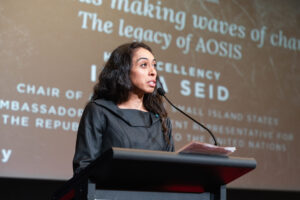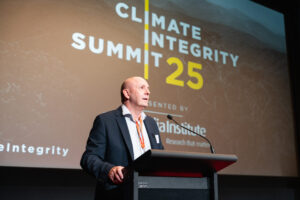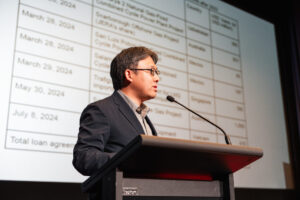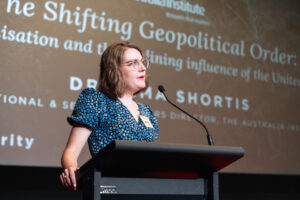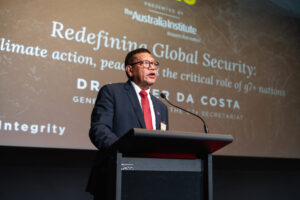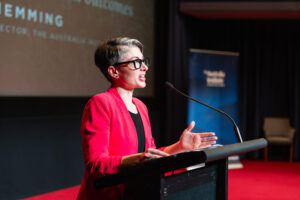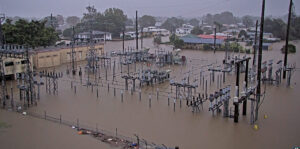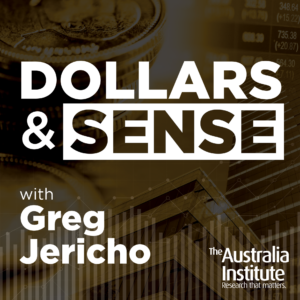February 2025
Woodside’s North West Shelf gas export project: a disaster on five fronts
Australia Institute analysis reveals Woodside’s North West Shelf gas export project is driving up WA energy prices, threatening the state’s domestic gas reserves, paying even fewer royalties, corroding one of the world’s greatest artistic treasures, and wrecking the climate.
Fake fight over nuclear a distraction from real climate issues
A new report which reveals the coalition’s nuclear plan would send an additional two billion tonnes of emissions into the atmosphere and send power bills even higher is yet another distraction from the real issues in Australia’s energy debate.
Unmasking power…and challenging it | Between the Lines
The Wrap with Amy Remeikis In amongst the gestures, *everything* happening in the world this week, the Albanese government delivered two lessons in power. The first came through Anthony Albanese’s latest intervention in the fight to save the Maugean skate from extinction. For those unaware, the Maugean skate, also known as the ‘dinosaur fish’ because
Small Islands making waves of change: Legacy of AOSIS – Ilana Seid | Climate Integrity Summit 2025
Multilateralism plays a vital role in advancing climate justice. The representation of Small Island Developing States in the United Nations – both individually and through alliances such as AOSIS – has played a transformative role in advancing global climate justice and action.
Holding Leaders to Account – Richard Denniss | Climate Integrity Summit 2025
“Demanding better from our leaders is often met with threats like ‘well if you push too hard then you’ll get nothing’.” “Ignore this. It shows you’re winning.” Watch: In his opening remarks, Richard shows how far we have come since the Australia Institute’s first Climate Integrity Summit 3 years ago. Wrapping the Summit up, Richard
Beyond the Energy Security Myth: Japan-Aus LNG – Yuki Tanabe | Climate Integrity Summit 2025
This session exposes the myth that Japan’s energy security depends on Australian LNG imports and reveals that the energy “security” narrative by policymakers serves commercial interests rather than reflecting genuine energy vulnerability or regional instability.
The Shifting Geopolitical Order – Dr Emma Shortis | Climate Integrity Summit 2025
Dr Emma Shortis will examine the United States’ changing influence and the broader reconfiguration of the global geopolitical landscape.
Redefining Global Security – Dr Helder da Costa | Climate Integrity Summit 2025
Representing conflict-affected countries, the g7+ advocates for sustainable, inclusive solutions to address the interconnected challenges of climate resilience, peacebuilding, and development.
Real Zero. Real corporate leadership – Dr Shanta Barley | Climate Integrity Summit 2025
Too many corporate and government climate strategies continue to rely on offsets, carbon capture and storage and the land and ocean’s natural ability to absorb carbon.
Integrity at home shapes global outcomes – Polly Hemming | Climate Integrity Summit 2025
Despite frequent claims that Australia is ‘too small to make a difference,’ historical evidence demonstrates our nation’s outsized role in influencing international norms and policies.
Communicating with integrity: Building foundations for climate action | Climate Integrity Summit 2025
Robust, science-based climate action depends on the integrity of communication—including in journalism, advocacy, and the regulation of information.
Intergenerational Climate Equity – Senator David Pocock | Climate Integrity Summit 2025
As we face the escalating impacts of climate change, the decisions we make today define the opportunities, rights, and wellbeing of future generations.
Creating jobs and building a good society while meeting the global warming challenge – Doug Cameron | Climate Integrity Summit 2025
Far from costing Australians, decisive climate action will, in fact, strengthen Australia’s economy, security, community wellbeing and international influence.
Australia and the Pacific ‘Family’ – Savenaca Narube | Climate Integrity Summit 2025
As economic challenges in Pacific Island Countries are compounded and exacerbated by the climate crisis, the strength of what the Australian Government calls ‘the Pacific family’ is being tested.
Climate crisis escalates cost-of-living pressures
A new report has found direct connections between the climate crisis and rising cost-of-living pressures. Failure to lower emissions now will only aggravate the crisis, with each moment of inaction compounding the pressure on households.
Private sector demands ‘real zero’ policies and an end to fossil fuels
Some of Australia’s best-known and most respected industry, business and community leaders have written an open letter to state and federal MPs calling for an end to the “net zero smokescreen” to “secure Australia’s prosperity”.
Ensuring workers’ safety in the climate crisis
As I watched the fires in Los Angeles unfold in January this year, my mind of course reflected on the 1999-2000 Black Summer bushfires in Australia. Both these seasons have wrought significant damage to humans and other animals, and to land, infrastructure and property. There has been a huge personal, collective and financial toll involved.
Trump’s Gaza Grab | Between the Lines
The Wrap with Amy Remeikis On September 30, 1938 British Prime Minister Neville Chamberlain stood outside 10 Downing Street and declared the Munich Agreement had appeased German Chancellor Adolf Hitler’s territorial aims. “I believe it is peace for our time,” he said. “…Go home and get a nice quiet sleep.” Germany violated the agreement almost immediately.
Australia’s biggest companies turn their backs on flawed carbon offset scheme
The revelation that many of Australia’s biggest companies have quit a government-run carbon offset scheme is real-world, real-time proof that carbon credits don’t work.
95 top Australian and international artists unite to stop the destruction of one of the world’s greatest artworks
Many of Australia’s most renowned artists, writers and musicians are calling on Environment Minister Tanya Plibersek to stop the destruction of one of world’s most important artworks and cultural heritage sites, the Murujuga petroglyphs in Western Australia.
January 2025
Compared to the cost of protesting, buying time with a minister is very cheap
In Australia today, corporate lobbyists can cheaply access politicians in private while peaceful public protestors face draconian penalties.
The Election at the End of the World
In the wake of the catastrophic LA fires, how do the Australian major parties shape up on climate policy?
LA fires add to climate insurance crisis
The wildfires devastating Greater Los Angeles will add to the global climate insurance crisis – forcing household premiums even higher – according to new analysis by The Australia Institute.
Fossil fuel subsidies
When governments subsidise fossil fuels—coal, gas, diesel, petrol—they not only waste public money, they also make climate change worse. Subsidies and tax breaks make fossil fuels cheaper, making it harder to switch to renewable energy and cleaner technologies. Ending fossil fuel subsidies is common sense and good policy.
$10,000 fine manifestly inadequate for Santos oil spill
A $10,000 fine issued to Santos for a large oil spill off the coast of Western Australia is little more than a slap on the wrist for the multi-billion-dollar gas company. But it’s a slap in the face for anyone concerned with protecting Australia’s natural environment.
December 2024
Highway to hell with Joëlle Gergis | Summer Book Club
Do Australians truly grasp the impact of a warming planet and what it could mean for our sunburnt country?
Minister’s early Christmas gift to coal companies
Environment Minister Tanya Plibersek has given an early Christmas present to coal companies by approving three new mine expansions – Caval Ridge (Qld), Boggabri mine (NSW) and Lake Vermont (Qld).
Minister’s Christmas card to foreign gas companies – for whom every day is Christmas
Resources Minister Madeleine King’s latest opinion piece in News Corp newspapers serves the interests of gas corporations at a time when Australians are struggling with an expensive Christmas.
Mapping how extreme heat exacerbates inequality
Extreme heat is the number one cause of weather-related illness and death in all parts of Australia, except Tasmania. Older, poorer, and sicker people are more vulnerable to the effects of extreme heat. Our new report identifies the locations around Australia in which the greatest number of vulnerable people will be affected by extreme heat. Targeting these areas for support will ensure the greatest number of vulnerable people are helped during periods of extreme heat.
Dutton revival of ‘gas fired recovery’ bad for households, great for gas companies
The Federal Coalition’s revival of Scott Morrison’s Gas Fired Recovery is likely to increase emissions and keep gas prices high.
General Enquiries
Emily Bird Office Manager
mail@australiainstitute.org.au
Media Enquiries
Glenn Connley Senior Media Advisor
glenn.connley@australiainstitute.org.au



